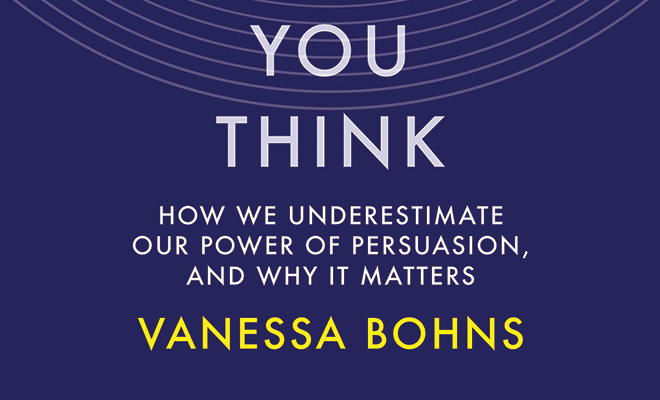
You Have More Influence Than You Think by Vanessa Bohns
Vanessa Bohns is a social psychologist and professor of organizational behavior at Cornell University. She holds a PhD in psychology from Columbia University and an AB in psychology from Brown University. Her writing has appeared in the New York Times, Wall Street Journal, Harvard Business Review, and her research has been featured by the Wall Street Journal, New York Times, Economist and NPR’s Hidden Brain.
Now, lookit here.
There’s something you need to know, eyes forward and listen, keep an open mind and a shut mouth, and pay attention. Then know that this is not the way to persuade anyone to do anything; in fact, it’ll backfire and in You Have More Influence Than You Think by Vanessa Bohns, you’ll learn what will work to gently change someone’s mind.
“Hey, I like your shirt!”
It literally takes two seconds to say that, but watch what happens when you say it to a stranger: they stand a little taller, happily flustered that someone approves; they feel good, and boom, you’ve just influenced someone to smile.
You’d be surprised at how easy it is to be influential, says social psychologist Bohns. You just have to be noticed, and you won’t need to “wave your hands around and shout” for that to happen. If you want attention, “you already have it” because we humans are “wired to notice… people,” and people who are noticed are often followed.
“We are instinctively attuned to other people-we notice them, remember them, wonder what is going on in their minds, tune our thoughts and messages to them, and copy their behavior,” Bohn notes. “But that means other people are also attuned to us and exhibit the same behaviors to us. When we think about how much influence we have, the first mistake we make is underestimating how much other people pay attention to us.”
So, you have influence without even trying, but how do you create the biggest impact? Here’s another surprise: studies show that sometimes, all you have to do is ask. Students sent out to borrow cell phones from strangers were successful more than not; one experiment proved that people will commit minor vandalism, if they’re asked.
This may be explained by an extreme human difficulty in saying “no.” Research shows that even if something is illegal or uncomfortable and a person clearly doesn’t want to say “yes,” many will, to avoid saying “no.” This, says Bohn, is why understanding the ask is essential, and dating and mating can be irritating; add perceived power to the mix, and an issue becomes less influential and more wrong.
To further your influence, try to connect with people. State what you think; that alone may help. Utilize crowd behavior. Always communicate in person. And chill; as every parent will tell you, overreactions just make things worse…
You are being watched. And that’s a good thing but it can also be detrimental, so complete your actions wisely: in You Have More Influence Than You Think, you’ll see how even innocuous behaviors can make an impact.
Beware, but as author Vanessa Bohns states, there’s no need to be paranoid if you keep in mind that the title of this book is correct and that being an influencer has serious weight. Indeed, the notion that influence can be harnessed with a mere appropriately-stated request is almost shocking, like having a Superpower that’s too big to control. Whether it’s verbal, action, or a posting, your influence can hurt someone and can cause misinformation and rumors to be perceived as truth, even when said in jest. Pick your convictions with caution, as she indicates, and remember that
“You don’t need to have an opinion on everything.”
Read You Have More Influence Than You Think carefully and with great thought, take its confidence-boosting, and use it wisely. There’s power in this book and if you need sway, lookit here.
Editor’s note: Of interest is Bohns’ discussion of British philosopher of language Paul Grice’s highly influential theory of conversational norms, a theory that has had a lasting impact on the science of communication. “Central to Grice’s theory is the idea that communication is a cooperative endeavor. In order to understand one another, we must work together. And in order to do that, we must have some ground rules, which Grice called maxims. According to Grice, the very first maxim of communication is that people should only say what is true, meaning that we shouldn’t say something we know to be false, and we shouldn’t say something for which we don’t have evidence.” Those who have read Malcolm Gladwell’s Talking to Strangers will recognize his concept that humans “default to truth;” that is, we tend to take on face value the things people tell us, even if we should know better. Particularly apropos for 2022, wouldn’t you say?







